When I'm bored, I like to fiddle around with math and science. I try to teach myself tricky concepts. Earlier this week it was special relativity. Here's something I tackled a few months ago. Enjoy.
Euler's identity
In mathematics, certain numbers are important. They have special properties, and they seem to pop up everywhere. Five in particular stand out: 0, 1,
i,
π, and
e. These five can be related in a mathematician's wet dream: Euler's formula.

It has each of the big five mathematical constants, an addition, a multiplication, and an exponent. It's simple and elegant. It's beautiful. It's mind-blowing.
It would be tempting to go down a rabbit hole and start breaking down the history and meaning of each of the components of this equation. However, such an explanation would be incredibly technical, and I doubt anybody on a music forum would be interested in reading it. Instead, I'm going to explain why Euler's identity works, in a way that (hopefully) anyone who knows basic math can understand. There's a much quicker, more elegant way to prove it using calculus, but all you need for this explanation is algebra. Trigonometry is a bonus.
I guess I should provide a little background about each number.
e is approximately 2.17828. It has a bunch of special properties that make it very important.
i is an imaginary number, the square root of -1. It doesn't exist in the real world, since no number multiplied by itself can be negative. (Think about it: positive × positive = positive, negative × negative = positive, zero × zero = zero.) However, it's useful for manipulating equations—eventually, all the
i's end up as
i²'s and can be replaced with -1's. Electrical engineers use it in calculations involving alternating current, among other things.
π is a circle's circumference (perimeter) divided by its diameter (the distance across). Hence the equation
circumference = 2πr. (
r is the half the diameter, or the radius, of a circle.) I don't need to explain 1 and 0.
We can express numbers such as
π and
e, which have an infinite number of decimal places, as the sum of an infinite series.
e is the sum of
1/0! + 1/1! + 1/2! + 1/3! ... The ellipsis points mean the numbers go on and on, following that pattern. The exclamation points denote "factorial."
3! = 3 × 2 × 1,
4! = 4 × 3 × 2 × 1, etc. Don't worry too much about the factorial concept, it's not important in this discussion. The important thing is that we can accurately express a number as the sum of an infinite series, called a "Taylor series."
It turns out that
e^x (alas, no easy superscripts on MB) can be expressed as the sum of the infinite series
x^0/0! + x^1/1! + x^2/2! + x^3/3! ... We can substitute any number for
x. To find the series for
e², we would plug 2 into that equation. So, we plug in the number
ix, which is not the Roman numeral for 9, but the imaginary number
i times any number
x. This leaves us with the following expression:
e^ix = (ix)^0/0! + (ix)^1/1! + (ix)^2/2! + (ix)^3/3! + (ix^4)/4! + (ix)^5/5! + (ix)^6/6! + (ix)^7/7! + (ix)^8/8! ...
Which we can simplify by multiplying
(ix)² = (ix)(ix) = i²x² Oh yeah, in algebra, because use the letter
x, we usually do away with multiplication signs. If two letters are written back to back or with • in between them, that means they're being multiplied. Anyway, that series simplifies to
e^ix = 1 + ix + i^2x^2/2! + i^3x^3/3! + i^4x^4/4! + i^5x^5/5! + i^6x^6/6! + i^7x^7/7! + i^8x^8/8! ...
We can replace every
i² with -1. Thus,
i^3= -i,
i^4 = 1,
i^5 = i,
i^6 = -1,
i^7 = -i, and
x^8 = 1.
e^ix = 1 + ix - x^2/2! - ix^3/3! + x^4/4! + ix^5/5! - x^6/6! - ix^7/7! + x^8/8! ...
Now it's time to leave that series and move on to some basic trigonometry.

Just remember that the sine of angle
A is
a/c and the cosine of angle
A is
b/c. These ratios can be calculated for any angle. It turns out that the cosine of 180° is -1 and the sine of 180° is 0. Remember this.
Sine and cosine (sin and cos) can also be expressed as infinite series. We write
sin x to mean "the sine of an angle measuring
x."
It turns out that
cos x = 1 - x^2/2! + x^4/4! - x^6/6! + x^8/8! ...
Aha! We can plug that value into the series for
e^ix, leaving us with
e^ix = cos x + (ix - ix^3/3! + ix^5/5! - ix^7/7! ...)
It also turns out that
sin x = x - x^3/3! + x^5/5! - x^7/7! ...
We multiply everything by
i:
i sin x = ix - ix^3/3! + ix^5/5! - ix^7/7! ...
Voila! We plug that value into the other series and get
e^ix = cos x + i sin x
To get Euler's formula, we let
x equal
π.
e^iπ = cos π + i sin π
Now, I must introduce one more thing. You're probably used to seeing angles measured in degrees. Mathematicians like to measure them in radians, a dimensionless unit where
π = 180°. Remember how I said earlier that the cosine of 180° is -1 and the sine of 180° is 0? Well, that means that the cosine and sine of
π are also -1 and 0. Plug these values in and we get something that looks like this:
e^iπ = -1 + i • 0
Zero times anything is zero, so
e^iπ = -1
We rearrange to get

Why am I posting this on a music forum?





 Hybrid Mode
Hybrid Mode